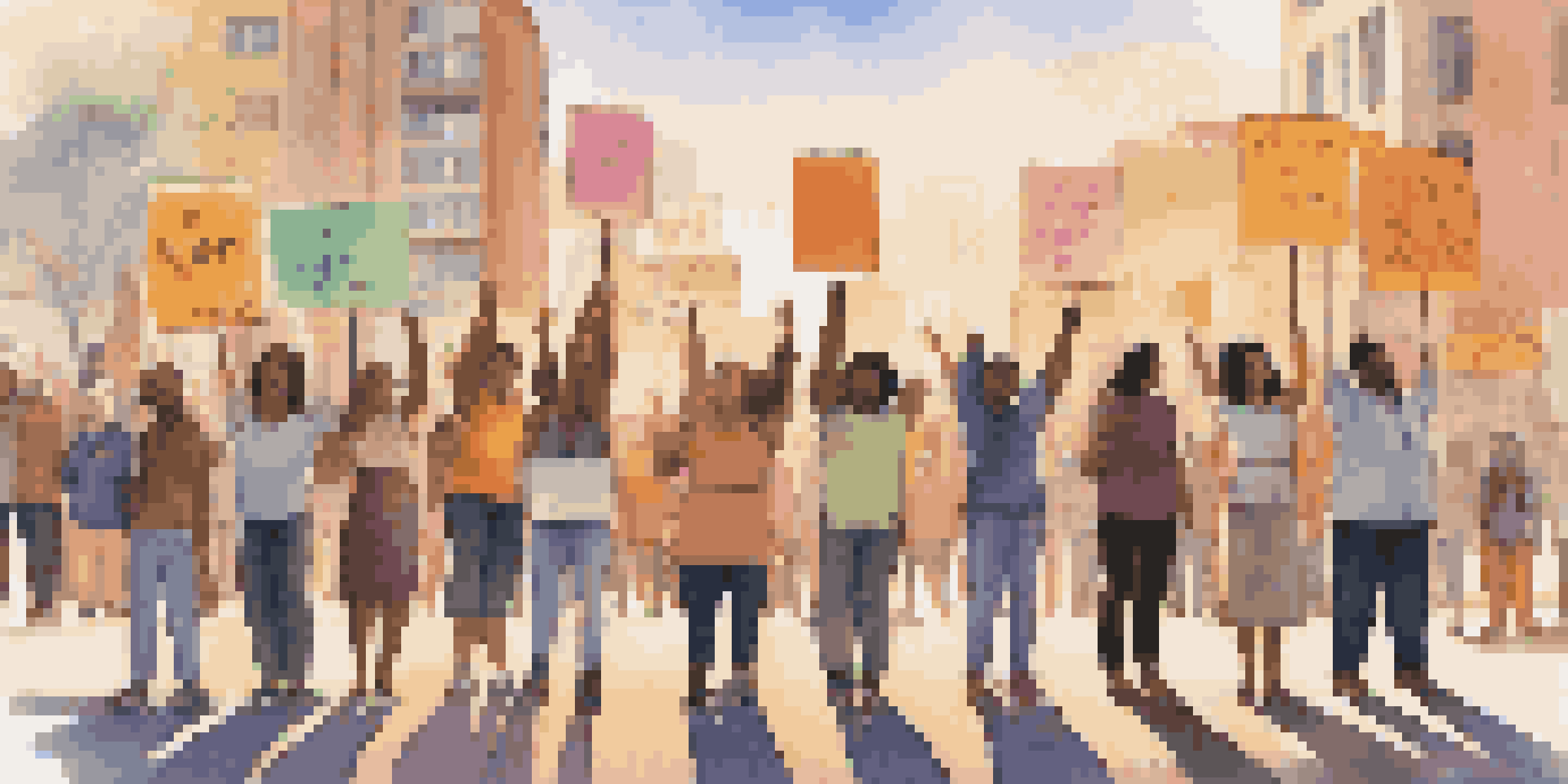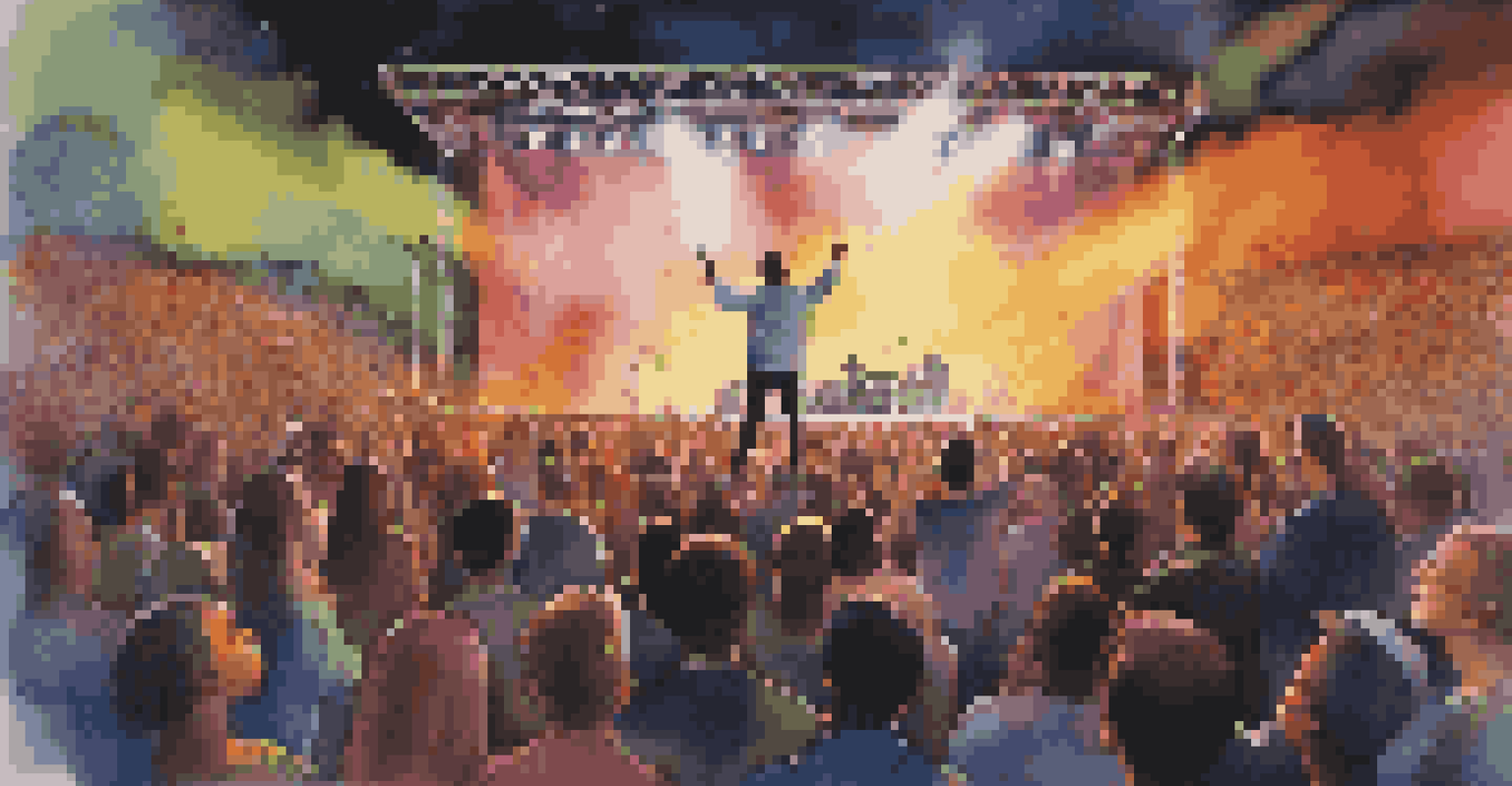The Influence of Music on Social Movements and Change

Music as a Catalyst for Social Change
Music has long played a crucial role in social movements, serving as a powerful catalyst for change. From protest songs to anthems of hope, melodies can inspire action and unite people around a common cause. Think of the iconic 'We Shall Overcome' during the Civil Rights Movement—its lyrics became a rallying cry that echoed through the streets.
Where words fail, music speaks.
The emotional weight of music can evoke feelings of solidarity and urgency, making it an effective tool for activists. When people sing together, they feel a sense of belonging and purpose that can motivate them to take a stand. This shared experience fosters a community spirit that is essential for any movement seeking to create lasting change.
Moreover, music can communicate messages that resonate deeply, often transcending language barriers. Songs like 'Fight the Power' by Public Enemy not only voice dissent but also galvanize listeners to challenge the status quo, illustrating how music can amplify the voices of the marginalized.
Historical Examples of Music in Movements
Throughout history, music has interwoven itself with social movements. The anti-war protests of the 1960s were profoundly shaped by songs like 'Give Peace a Chance' by John Lennon, which became synonymous with the fight against the Vietnam War. Such songs provided a soundtrack to the era, capturing the sentiments of a generation seeking peace and justice.

Similarly, during the Apartheid era in South Africa, artists like Miriam Makeba used music to raise awareness about the injustices faced by their people. Her song 'Pata Pata' not only showcased cultural pride but also became a symbol of resistance against oppression, demonstrating how music can forge a path for social awareness.
Music Drives Social Change
Music serves as a powerful catalyst for social movements, inspiring action and uniting people around common causes.
These historical examples show that music is not just entertainment; it is a powerful form of resistance and a tool for social justice. By highlighting struggles and celebrating victories, music can inspire generations to continue the fight for equality.
The Role of Lyrics in Shaping Movements
Lyrics often serve as the heart and soul of a song, conveying messages that can resonate deeply with listeners. Activists frequently use lyrics to articulate their struggles and aspirations, making them memorable and impactful. For instance, the lyrics of 'Alright' by Kendrick Lamar have become a mantra for the Black Lives Matter movement, encapsulating hope and resilience amidst adversity.
Music can change the world because it can change people.
In this way, lyrics become a form of storytelling, allowing individuals to connect with the experiences of others. When people hear words that reflect their own struggles, it fosters a sense of validation and encourages collective action. This connection can motivate individuals to participate in movements, knowing they are not alone in their fight.
Additionally, well-crafted lyrics can challenge societal norms and provoke thought. Songs that address issues like inequality or climate change can inspire listeners to question the status quo and spark conversations that lead to change. This artistic expression serves as a reminder that music can be both a personal and political tool.
Music’s Power to Unite Diverse Groups
One of music's most remarkable abilities is its power to unite individuals from diverse backgrounds. During protests, songs often bring together people who might otherwise have differing opinions or experiences, creating a sense of unity. For example, the global phenomenon of 'Imagine' by John Lennon serves as a universal call for peace, resonating with people from all walks of life.
This unifying force can be seen in events like Live Aid, where musicians from various genres came together to raise awareness for famine relief in Ethiopia. The collaboration across musical styles showcased how music can bridge divides and inspire collective action, demonstrating its ability to transcend cultural barriers.
Lyrics Shape Collective Action
The emotional and storytelling power of lyrics resonates deeply with listeners, motivating them to connect and engage in activism.
Moreover, when people sing together in solidarity, it fosters a shared identity among participants. This collective experience can strengthen movements, as individuals feel part of something greater than themselves, further motivating them to advocate for change.
Modern Music and Social Media’s Impact
In today's digital age, the fusion of modern music and social media has amplified the influence of music on social movements. Platforms like Twitter and Instagram allow songs with powerful messages to spread rapidly, reaching global audiences. For instance, the song 'This Is America' by Childish Gambino ignited discussions about gun violence and racial inequality, demonstrating how music can quickly become a focal point for activism.
Social media also enables artists to engage directly with their fans, fostering a sense of community around shared values and beliefs. This interaction can inspire listeners to take action, whether that means attending a protest or supporting a cause. The immediacy of social media allows for real-time responses to social issues, making music an ever-relevant part of advocacy.
Additionally, viral trends often bring attention to social issues, as seen with movements like #BlackLivesMatter, where music plays a crucial role. Songs associated with these hashtags help to create a collective identity and rally support for causes, showing how modern music continues to shape social movements.
The Emotional Connection of Music in Activism
The emotional connection that music fosters is a significant factor in its effectiveness as a tool for activism. Songs can evoke powerful feelings, ranging from joy to sorrow, which can deepen an individual's connection to a cause. When people listen to music that resonates with their emotions, they are more likely to engage and participate in social movements.
For example, the song 'Where Is the Love?' by The Black Eyed Peas addresses social issues like racism and violence, prompting listeners to reflect on their values and actions. This emotional appeal can serve as a catalyst for change, encouraging individuals to take a stand and advocate for a better world.
Modern Music Meets Social Media
The fusion of modern music and social media amplifies activism, allowing powerful messages to reach global audiences and inspire real-time action.
Furthermore, music can create lasting memories associated with movements, making the emotional connection even stronger. When people look back on significant events, the songs that accompanied those moments often evoke nostalgia and a renewed sense of purpose, reminding them of the collective struggle for justice.
Conclusion: The Lasting Legacy of Music in Movements
As we reflect on the influence of music on social movements, it becomes clear that its power extends far beyond mere entertainment. Music serves as a voice for the voiceless, a source of inspiration, and a unifying force that can galvanize communities. The legacy of songs associated with significant movements will endure as reminders of the struggles fought and the victories won.
Looking forward, the role of music in activism will likely continue to evolve, especially with the advent of new technologies. As artists harness the power of music and social media, we can expect to see innovative ways that songs inspire action and bring about change.

Ultimately, music will always remain a vital part of the human experience, intertwining itself with our collective narratives. As long as there are stories to tell and injustices to fight, music will be there, echoing the calls for social change across generations.